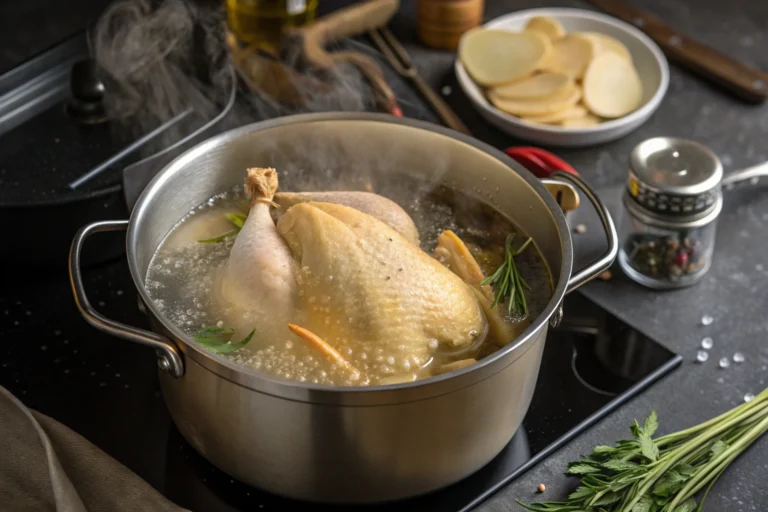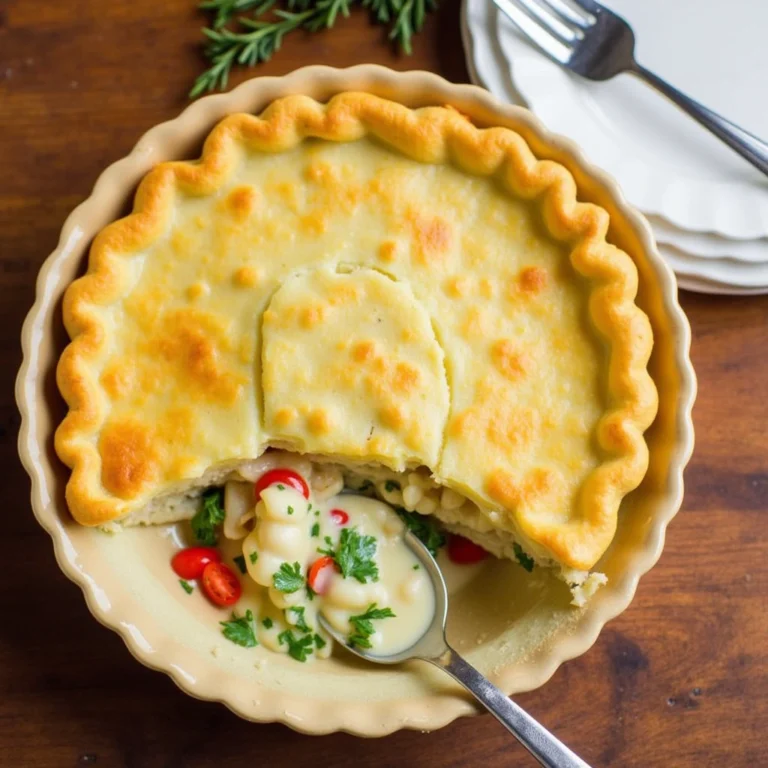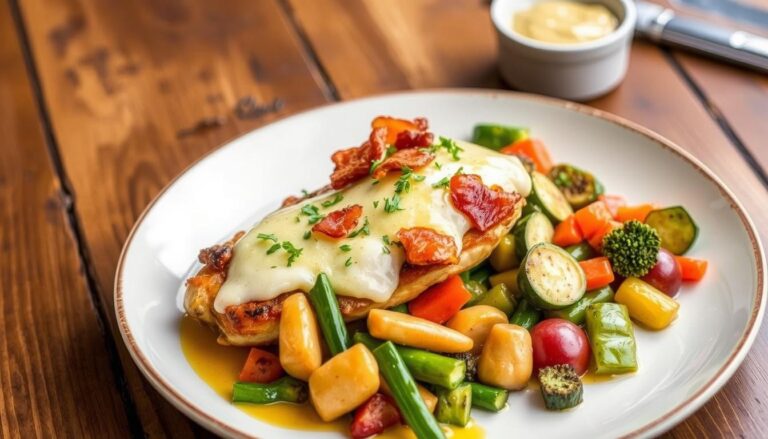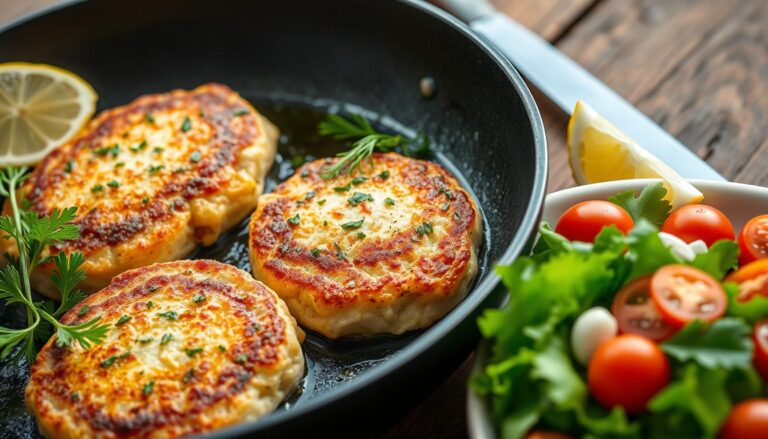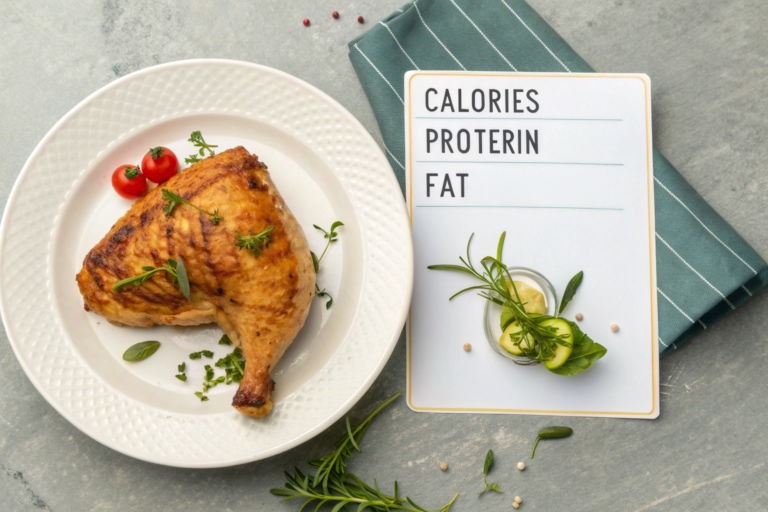Recipe for Bone-In Chicken Breast
Bone-in skin-on chicken breasts are not common in stores, but they taste better than boneless ones. You can find them by cutting a whole chicken into pieces yourself. This allows you to save money while gaining more value.
To cook bone-in chicken breasts, roast them in a hot oven, around 400°F. This technique creates crispy skin and keeps the meat juicy. Before seasoning, brush the chicken with oil and mix salt, pepper, garlic powder, and paprika. This blend adds great flavor and color to your recipe for bone in chicken breast.
With the right techniques, you can make a healthy sliced chicken recipe for meal prep or dinner. This chicken breast meal prep guide is perfect for beginners and experienced cooks alike. It will help you make bone-in chicken breasts perfectly.
Table of Contents
Why Choose Bone-In Chicken Breast?
Bone-in chicken breasts are great for those who want tasty and moist low-carb chicken dishes or lean protein meals. They have many benefits over boneless, skinless chicken.
Flavor and Moisture
The bone and skin of the chicken breast add flavor and moisture. Roasting with bone and skin keeps juices inside, making the meat tender and juicy. Bone-in chicken breasts taste richer and more savory than boneless, skinless ones.
Cost-Effective Cuts
Bone-in chicken breasts are cheaper, especially in family packs. The bone and skin make them heavier, saving money. They’re perfect for meal prep and feeding big groups.
| Nutrition Comparison | Bone-In Chicken Breast | Boneless, Skinless Chicken Breast |
|---|---|---|
| Calories (per 8 oz serving) | 173 kcal | 165 kcal |
| Protein | 19 g | 31 g |
| Fat | 10 g | 3.6 g |
| Saturated Fat | 3 g | 1 g |
Bone-in chicken breasts are a smart pick for their taste, moisture, and value. They’re ideal for many low-carb chicken dishes and lean protein meals.
Essential Ingredients for Your Recipe
Creating tasty quick chicken breast dinners or marinated thin chicken breast recipes starts with the right ingredients. At the core of any great chicken dish are the split chicken breasts. They offer a perfect mix of juicy tenderness and rich flavor.
Fresh Chicken Breast
Go for bone-in, skin-on chicken breasts for the best taste and moisture. These cuts are cheaper per pound than boneless, skinless ones. The bone and skin keep the juices in, making the dish juicy and flavorful.
Herbs and Spices
Add depth to your chicken with herbs and spices. Try garlic powder, paprika, and a bit of salt and pepper. For more flavor, use herbes de Provence or an all-purpose seasoning. Fresh herbs like rosemary or thyme add a bright, herbaceous taste to your marinade or rub.
Cooking Oil
Choose a neutral-flavored oil like olive or grapeseed oil for cooking. These oils handle high heat well, helping to get a crispy skin on your chicken breasts.
By picking fresh, quality ingredients, you’re set to make a tasty chicken dish. Your family and friends are sure to love it.
Preparing Your Bone-In Chicken Breast
Before you can enjoy the delicious flavor and juicy texture of bone-in chicken breasts, it’s essential to properly prepare them. Let’s dive into the steps to ensure your chicken is ready for the cooking process.
Thawing Properly
If your chicken breasts are frozen, take the time to thaw them thoroughly in the refrigerator. This gradual thawing process helps maintain the quality and prevent any bacterial growth. Depending on the size of your chicken, plan for 24-48 hours of thawing time in the fridge.
Patting Dry for Better Crispiness
Once your chicken is fully thawed, use paper towels to pat the surface dry. Removing any excess moisture will help create a crispy skin when you cook the chicken. This easy step can significantly impact the final texture of your dish.
If you prefer, you can also consider brining the chicken breasts for 15-60 minutes before cooking. This process enhances the flavor and helps keep the meat juicy. Just be sure to skip the salt in your seasoning if you choose to brine.
Lastly, line your baking pan with foil or parchment paper for easy cleanup. Arrange the chicken breasts skin-side up on the prepared pan, ready for the next steps of seasoning and cooking.
By following these simple preparation tips, you’ll be well on your way to enjoying perfectly cooked, crispy-skinned bone-in chicken breasts. Stay tuned for the next section, where we’ll explore seasoning your chicken for maximum flavor.
Seasoning Your Chicken for Maximum Flavor
Boosting the taste of your bone-in chicken breasts is simple. Begin by lightly brushing the chicken with olive oil. This step helps the spices stick and gives a tasty, crispy outside.
Simple Spice Mix
A mix of salt, black pepper, garlic powder, and paprika is great for chicken. It enhances the meat’s natural taste without being too strong. For more flavor, try adding Cajun seasoning or a southwest spice mix.
Marinade Ideas
- Tangy Balsamic: Mix balsamic vinegar, olive oil, Dijon mustard, garlic, and Italian herbs.Let it marinate for 30 minutes to 2 hours.
- Zesty Citrus: Blend orange or lemon juice, soy sauce, ginger, and honey. Let it marinate for 30 minutes to 2 hours.
- Herbed Yogurt: Combine Greek yogurt with thyme, rosemary, and parsley. Let it marinate for 30 minutes to 2 hours.
Don’t over-marinate, as it can make the chicken soft and mushy. Try various flavors to make healthy sliced chicken recipes or marinated thin chicken breast recipes.
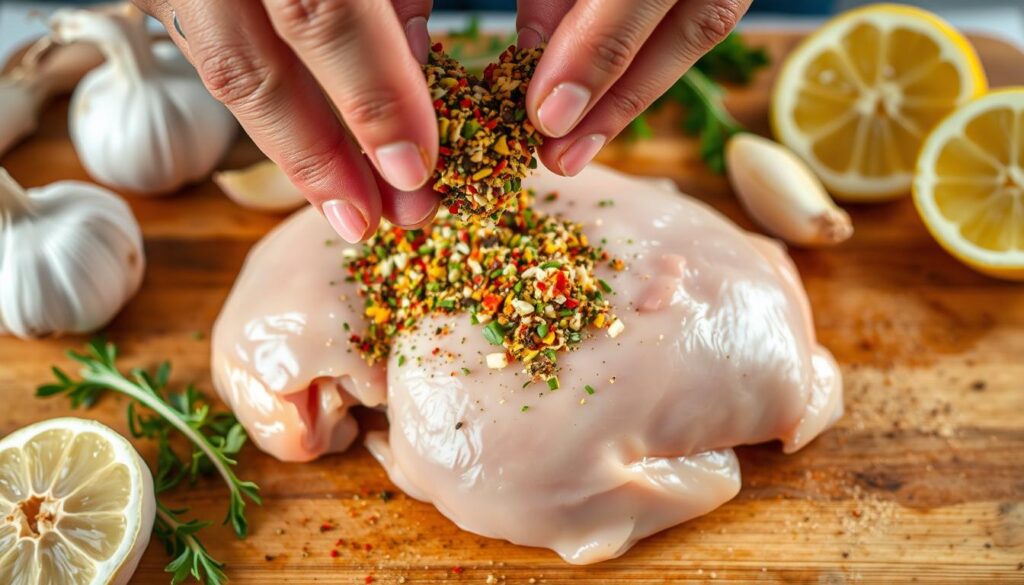
“The secret to perfectly seasoned chicken lies in balancing flavors. Begin with a basic seasoning, then experiment with marinades and spice blends to make it your own.”
Cooking Methods for Bone-In Chicken Breast
There are several ways to cook bone-in chicken breast. You can choose to roast it in the oven for a crispy skin or grill it for a smoky flavor. Both methods ensure juicy and flavorful chicken every time.
Roasting in the Oven
Oven roasting is a great choice for bone-in chicken breast. Heat your oven to 400°F and put the chicken on a baking sheet. Add some cooking oil and season with your favorite herbs and spices.
Roast for 35-40 minutes, or until it reaches 165°F inside. The high heat makes the skin crispy while keeping the meat tender.
Grilling Perfection
For a summer twist, grill the chicken. Preheat your grill to medium-high and oil the grates. Cook the chicken skin-side down for 5-7 minutes, then flip and cook for another 10-15 minutes until it’s 165°F inside.
Grilling adds a smoky flavor that enhances the chicken’s natural juiciness.
Whether you roast or grill, bone-in chicken breast is a delicious choice. Pair it with your favorite sides for a well-rounded meal.
| Cooking Method | Temperature | Cook Time | Internal Temp |
|---|---|---|---|
| Oven Roasting | 400°F | 35-40 minutes | 165°F |
| Grilling | Medium-High | 15-20 minutes | 165°F |
Cooking Times and Temperatures
Getting the cooking times and temperatures right is key for perfect quick chicken breast dinners or chicken breast meal prep. Whether you roast in the oven or grill, knowing the best settings is essential. This ensures your bone-in chicken breasts are juicy, flavorful, and cooked just right.
Oven Settings for Roasting
To get the best results, roast your bone-in chicken breasts at 400°F for 25-30 minutes. This method creates a crispy skin and keeps the meat tender. You can adjust the oven temperature to 350°F to 425°F, changing the cooking time. Always use an instant-read thermometer to check for doneness, aiming for an internal temperature of 165°F.
Grilling Time Guidelines
Grilling bone-in chicken breasts takes 20-25 minutes, flipping halfway. The high heat from the grill chars the outside while keeping the inside juicy. As with oven roasting, check the internal temperature and remove the chicken once it reaches 165°F.
Remember, cooking times can vary based on chicken size and thickness, as well as your oven or grill. Always rely on a meat thermometer to ensure your quick chicken breast dinners and chicken breast meal prep are perfectly cooked.
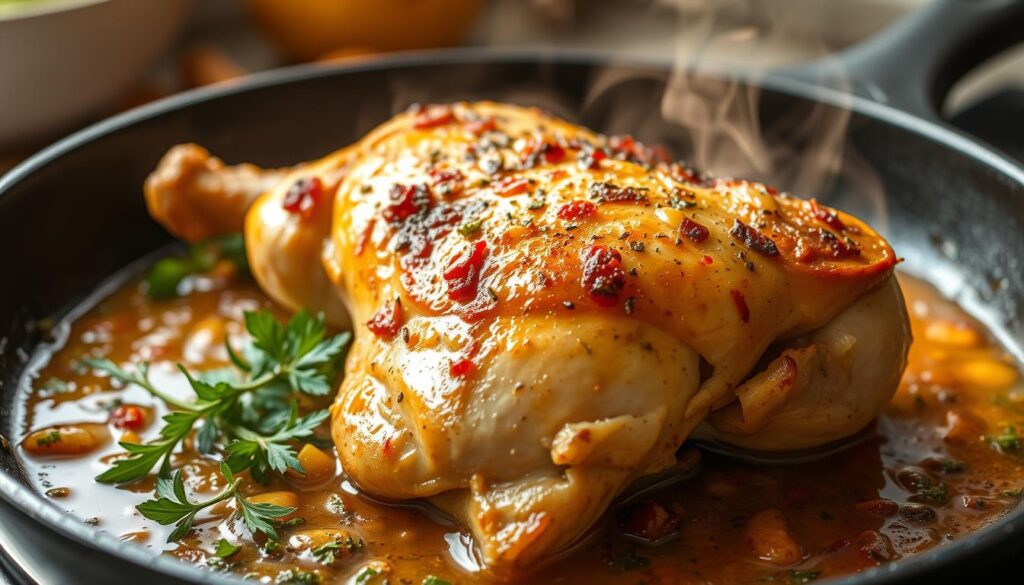
“Cooking bone-in chicken breasts is a game-changer for extra moisture and flavor. Just make sure to use a meat thermometer to prevent overcooking.”
Checking for Doneness
For lean protein chicken breast meals to be perfect, checking doneness is key. Use an instant-read thermometer to check the chicken’s internal temperature. It should be 165°F (75°C) in the thickest part, away from the bone.
Don’t just look at the chicken’s appearance. Instead, watch for clear juices and no pink meat when pierced. After cooking, let the chicken rest for 5-15 minutes. This makes it juicier and more tender.
Internal Temperature Recommendations
For the best results, use an instant-read thermometer. The USDA says chicken should be 165°F (75°C) to be safe and fully cooked. Don’t overcook, as it can make the meat dry and tough.
Visual Cues for Perfectly Cooked Chicken
- The juices should run clear when the chicken is pierced with a fork or knife.
- The meat should no longer appear pink or translucent in the thickest part.
- The chicken should feel firm to the touch, with a slight resistance when pressed.
By using a thermometer and watching for these signs, you can make sure your lean protein chicken breast meals and healthy sliced chicken recipes are always perfect.
Tips for Crispy Skin
Getting crispy skin on your bone-in chicken breast is simpler than you think. Just a few easy steps can elevate your low-carb chicken breast dishes to new heights. You’ll enjoy better flavor and texture.
Dry Brining for Crispiness
Dry brining is a secret to crispy skin. Rub a light layer of salt on the chicken, focusing on the skin. Then, let it sit uncovered in the fridge for 1-2 hours. This step pulls out moisture, leading to crispier skin when cooked.
Finish with High Heat
To make your baked chicken breast cutlets even crisper, increase the oven heat in the last minutes. Roast at 400°F, then switch to broil for 2-3 minutes. This high heat will crisp up the skin beautifully.
For crispy skin, keep the chicken dry. Don’t baste it while it cooks, as this can make the skin soft. With some prep and the right cooking method, you’ll have crispy low-carb chicken breast dishes in no time.
Side Dishes to Pair with Chicken Breast
When you’re prepping chicken breast or enjoying a healthy sliced chicken recipe, the right side dishes can make a big difference. Find a range of tasty and healthy options that go great with the chicken’s juicy and tender texture.
Vegetable Options
Roasted veggies are a fantastic match for chicken breast. Try roasting Brussels sprouts, carrots, or asparagus with olive oil, salt, and pepper. For a burst of color and crunch, a kale Caesar salad or a grilled Caesar salad with romaine lettuce is perfect.
Starch Suggestions
For a comforting side, pair chicken breast with creamy mashed potatoes or roasted red potatoes. For a lighter choice, quinoa or steamed rice are great. If you want something different, try barley or black-eyed peas.
Use the same pan as the chicken to roast veggies for extra flavor and easy cleanup. Or, a simple green salad with tomatoes and cucumbers adds a refreshing touch.
Experimenting with different side dishes is key to a balanced and enjoyable meal. By choosing the right sides for your chicken breast, you’ll get a meal that’s both flavorful and healthy.
Storing and Reheating Leftovers
Proper storage and reheating of your leftover chicken breast are key to keeping it fresh and safe. To keep your chicken breast meal prep and quick chicken breast dinners good, follow these tips:
Proper Storage Techniques
Keep cooked chicken breast in airtight containers in the fridge for up to 4 days. Or freeze it for up to 4 months. For meal prep, remove the skin and bones before shredding or dicing. When you’re ready, thaw frozen chicken breast in the fridge overnight.
Best Reheating Methods
- Reheat chicken breast gently in a pan on the stove.This helps preserve its texture and flavor.
- Make sure the reheated chicken breast reaches 165°F (74°C) to kill bacteria.
- Cold leftover chicken breast is great for salads, wraps, and other cold dishes.
By using these easy storage and reheating tips, you can enjoy tasty and safe chicken breast dishes for your meal prep and quick chicken breast dinners.
Common Mistakes to Avoid
When cooking bone-in chicken breasts, watch out for common mistakes. OOvercooking can cause the chicken to become dry and tough. This is not what you want for a juicy, flavorful dish.
Overcooking the Chicken
To prevent overcooking, use a meat thermometer. Aim for an internal temperature of 165°F. But remember, the chicken might get even hotter after it’s done cooking.
Try to avoid opening the oven or grill too frequently. This can mess up the cooking and make it take longer.
Skipping the Resting Time
Letting the chicken rest for at least 5 minutes is key. This step helps the juices spread evenly. It makes the chicken moist and full of flavor when you slice it.
Don’t skip this step. It’s crucial for a great-tasting dish.

